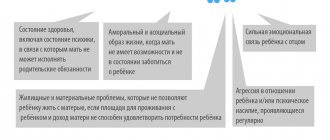Author of the article: Anastasia Ivanova Last modified: January 2021 6487
Guardianship authorities help ensure that children left without parental care find a new family. It is for this purpose that the state provides a procedure for the adoption of orphans. There are situations when a romantic relationship develops between a foster parent and a ward. The question arises: is marriage possible between adoptive parents and an adopted child? From a moral point of view, such a union is allowed, since the lovers are not relatives to each other. However, the Family Code of the Russian Federation lists the reasons why such relationships will not be officially registered.
Conditions for registering marriages
The civil registry office is the body charged with registering family relationships between citizens of the Russian Federation. Before the wedding ceremony, the couple submits an application to formalize their union. At this stage, civil registry office employees carefully study the data of citizens in order to prevent marriage between certain categories of persons.
In Russia there is a ban on creating a family between the following citizens:
- Married to other people;
- Adoptive parents and adopted children;
- Incapacitated;
- Blood relatives.
When submitting an application to the registry office, most likely future spouses will be denied registration of the relationship. There are “loopholes” in Family Law that can be used to circumvent the ban on such marriages. It is worth noting that in addition to the reasons listed above, you need to remember the following:
- The decision to marry must be mutual and voluntary;
- The people in the couple have reached the age of majority and are legally capable.
There are good reasons why a union can be registered starting from the age of 16. For example, the basis for early marriage is the woman’s pregnancy.
How does the adoption process work? First stage
The legal aspects of adoption are regulated by the Family Code of the Russian Federation (Chapter 19). The adoption process itself is quite long. It is impossible to resolve this issue quickly. Initially, a married couple wishing to adopt a child contacts social services. Experienced specialists will analyze the educational potential of the family. After this, potential adoptive parents undergo special courses in which they learn the skills of raising an orphan child.
After this, parents go through the process of selecting a child. Social services also help them with this. There is a special database of children who can be adopted. It is from this that the optimal option is selected (based on the wishes of the parents and the indicators of special psychological tests).
Why are marriages between adoptive parents and their wards prohibited?
In our country, adopted children, along with their own children, are considered relatives of their adoptive parents. After a guardian accepts someone else’s child into his own family and commits to the state to support and raise him, their relationship acquires the status of family. This connection is expressed in the following aspects:
- In the future, if the adopted child gives birth to children, they will be officially recognized as natural grandchildren to the adoptive parent;
- The law provides for the secrecy of adoption. When transferring a child to a foster family, his data in the documents is changed to those that could be in the case of a blood relationship with the guardians (last name, patronymic, registration). In addition, employees of the educational institution and other participants in the process sign a document on non-disclosure of the secrecy of adoption;
- Relationships between natural and adopted children are established as between blood relatives. The biological mother and father cannot legally communicate with their offspring under the care of other parents. Also, they do not know the new address of their adopted children;
- In the event of the death of one of the guardians, the adopted child will claim the inheritance. He is endowed with the same property rights as the blood relatives of the adoptive parent;
- Once adopted by a new family, the child will not be able to receive child support from his biological parents. Any connections, including responsibilities, between them are interrupted.
Expert commentary
Kamensky Yuri
Lawyer
Thus, the adopted child becomes a full member of the family, both legally and morally. Family law protects these relationships and equates them to blood ties. The listed facts explain why marriage between adoptive parents and adopted children is prohibited in the Russian Federation. Despite the fact that the child was not born to the guardians, according to the law he is a close relative to them.
There are cases when the guardian and ward try to deceive the registry office and conceal the fact of adoption. However, such behavior can lead to serious consequences. An illegally registered union will be dissolved, and citizens will be prosecuted.
Personal rights and obligations of spouses
Among the personal rights and responsibilities of spouses, the IC includes the freedom of choice by spouses of their occupation, profession, place of stay and residence, and some other rights, as well as the responsibilities of spouses in relation to each other. The provision on equality of spouses in the family is aimed at ensuring and is a continuation of the constitutional norms that define the basis of the legal status in the Russian Federation: on equal rights and freedoms of men and women and equal opportunities for their implementation, on the freedom of each citizen to choose their place of stay and residence, type of activity and profession, about the care and upbringing of children as equal rights and responsibilities of both parents, about the inadmissibility of the abolition and derogation of these rights and freedoms of citizens. In accordance with constitutional norms, the RF IC assigns to spouses the right to freedom in choosing occupations, professions, places of stay and residence. These rights of spouses are closely related to the personality of each spouse, and they cannot be canceled or limited by agreement between the spouses. If such conditions are included in the marriage contract, they are void, that is, they have no legal force. Usually, the choice of occupations and professions by spouses is agreed upon primarily based on the interests of the family, but the implementation of this right in life can be the cause of family conflict, family breakdown and divorce.
Place of residence and cohabitation of spouses
It should be noted that, although each of the spouses is given the opportunity to independently determine their place of residence, the RF IC still gives priority to the joint residence of the spouses, as evidenced by the general orientation of its norms. The issue of the place of residence of the spouses must be decided by their mutual consent. Cohabitation of spouses, especially in cases where there are children in the family, is the most important condition for its strength, and for these purposes it is ensured by law. Thus, spouses enjoy equal rights arising from the social tenancy agreement for residential premises; the spouse acquires the right to use residential premises in cases where the spouse, the owner of this residential premises, moves into the living space. However, when living together for some reason is impossible, the law proceeds from the free decision of each spouse on the issue of separation.
Spousal equality
In family life, neither spouse can enjoy any preferential rights over the other, therefore the law establishes that issues of maternity, paternity, upbringing, education of children and other issues of family life are resolved by the spouses jointly based on the principle of equality of spouses. Moreover, family law establishes that spouses are obliged to build their relationships in the family on the basis of mutual respect and mutual assistance, and are also obliged to contribute to the strengthening of the family and its well-being, and to take care of the well-being and development of their children. This means that both spouses should not only strive to the best of their ability and ability to contribute to the material well-being of the family, but also create a favorable atmosphere in it, promote the comprehensive spiritual, moral and physical development of all family members, especially minor children.
The principle of equality of spouses in the family is also reflected in the provisions of the legislation on the personal rights and responsibilities of spouses, according to which spouses, at their own discretion, choose a surname when marrying one of them as a common surname, or each spouse retains their premarital surname. As a rule, spouses take a common surname. A common surname emphasizes the common interests of all family members and facilitates the exercise of rights and responsibilities by spouses, parents and children.
How to conclude a marriage between a guardian and an adopted person?
It has long been known that marriages between blood relatives are prohibited in most countries.
The basis for this was numerous studies and conclusions of doctors. It has been proven that children born from consanguineous parents are susceptible to serious diseases and various pathologies. In the case of marriages between guardians and adopted children, the prohibition is only formal. Such unions do not pose any threat to the future generation. Adoption is a reversible process; the law allows the dissolution of family ties between people.
Before canceling the procedure, you need to pay attention to the following features:
- Only the court makes a decision to relieve the guardian of the responsibilities for raising and maintaining the adopted child;
- Both the guardian and the adopted child (provided that he is over 18 years old) can file a claim to cancel the adoption;
- Both parties are invited to participate in the court hearing;
- The prosecutor participates in the judicial process as a person monitoring compliance with the law.
A citizen, by his own decision, adopts a child. Other people cannot influence his choice. Therefore, no one has the right to force him to be a foster parent. The guardian may apply to the court to cancel the adoption procedure.
The claim states the following grounds::
- Difficult financial situation due to which a person cannot support an adopted child;
- Poor relationship between guardian and ward;
- The cancellation of an adoption is a mutual decision between the two parties;
- The adoptive parent has health problems, is declared incompetent, or has received a disability.
Whatever the reason, the claims must be satisfied by the court. After the decision is made, all obligations between the guardian and the ward are severed.
The following persons can apply to court to cancel an adoption:
- Representative of the prosecutor's office;
- Guardianship officer;
- An adopted citizen who is 18 years old;
- Adoptive parent.
Expert commentary
Gorchakov Vladimir
Lawyer
Cancellation of the adoption procedure will allow the former guardian and ward to register the marriage.
Underwater rocks
Adoption is established for an indefinite period and after the child reaches the age of majority, its cancellation is impossible, because the legal meaning is lost due to the child’s full civil capacity.
The only circumstance for the termination of such relationships is the mutual consent of the parties, as well as the consent of the parent or parents of the child, if they are alive, are not deprived of parental rights and are recognized as capable (Article 144 of the Family Code).
You may also be interested in: Housing alimony
If the biological parents have died, lost parental rights, or are incapacitated, then the court can also cancel the adoption by agreement of the parties.
Marriages between adopted children from different parents
Russian legislation prohibits registering marriages between blood brothers and sisters. However, there are times when a bond develops between adopted children from different biological parents. On the one hand, not being close relatives, such couples can create families, but by law they are considered relatives. Both citizens have a common surname and patronymic. In addition, they are entitled to the same rights in a foster family.
Despite the lack of blood relationship, a man and a woman will not be able to get married. To register a marriage, you will need to solve the problem of adoption. Adoptive parents must go to court to annul their relationship with one of the children.
It is important to follow all steps:
- Prepare and submit an application to the court to cancel the adoption of the child;
- Attend a court hearing, where the participants in the process will be guardianship officers, the prosecutor and adopted children;
- After a positive court decision, the former adopted child must restore his previous data (last name, first name and patronymic);
- Future spouses submit an application to the registry office to register the marriage.
Expert commentary
Kireev Maxim
Lawyer
The initiator of the process of canceling kinship can be either the guardian or the adopted child himself. The main condition is that the ward must be 18 years old at the time of filing the claim.
The concept of family, close relatives.
There is no precise definition of the concept “family” in legislative acts. Based on sociological and economic research, we can characterize the “cell of society”:
Family - persons living in the same territory, who are closely related, united by common rights and responsibilities arising from marriage, kinship, adoption or other form of adoption of children.
Family members are bound by economic, social and cultural goals.
Sociologists distinguish economic, protective, reproductive, spiritual, cognitive, educational and sexual-regulatory functions, through which citizens are recognized as a family.
Close relatives are people related by blood, or recognized as such by a court decision.
According to clause 2 of Article 14 of the RF IC, the following are considered close:
- Vertical relatives (grandfather, grandmother, mother, father, son, daughter, grandson, granddaughter);
- Horizontally - brothers and sisters, regardless of whether they have both parents in common or only one.
The husband and wife are not related by blood; family legal relations arise after the marriage is registered.
World practice
A ban on marriage between certain categories of citizens is in effect in many countries. The legal grounds are almost the same as in Russia, but there are differences:
- In countries professing Islam, polygamy is allowed. In our state, a family should consist only of a man and a woman. In Muslim states, a citizen is allowed to have up to 4 wives;
- Foreign citizens are prohibited from marrying blood relatives, including second cousins. In Russia, the ban does not apply to second cousins;
- Foreign states do not always limit the rights of citizens to marry between adoptive parents and adopted children. The reason for this loyalty is the lack of blood relationship between the people in the couple. In some countries, there is a certain authority that allows or prohibits marrying an adopted child;
- Almost all countries agree on the issue of marriage with an incapacitated citizen. Such unions are not registered due to human limitations. People often take advantage of the insanity of their other half for their own selfish purposes.
Is it possible to bypass the ban?
You need to understand that adoption is significantly different from consanguinity.
And all because the adoption can be terminated at any time. But it is simply impossible to do the same with blood relationships. The current legislation does not indicate grounds for annulment of adoption . The law contains a detailed description of the procedure, which has its own characteristics.
The adoption can be terminated based on the decision of the relevant institution that is involved in the matter. The adoptive parent and a representative of the guardianship authority must take part in this meeting.
Legal restrictions on marriage
According to the law of the Russian Federation, marriage of two adults of the opposite sex is permitted subject to mutual consent. However, there are some limitations here. For the most part, they are determined by the culture of the people, so they can vary significantly in different federal districts. Russian legislation may prohibit marriage in the following situations:
- If one of the parties is married, that is, is in an active marriage.
- Marriage between adopted children and adoptive parents is prohibited.
- Incapacitated persons cannot marry until this status is revoked (if the restriction is temporary).
- Marriage between close relatives is also prohibited.










